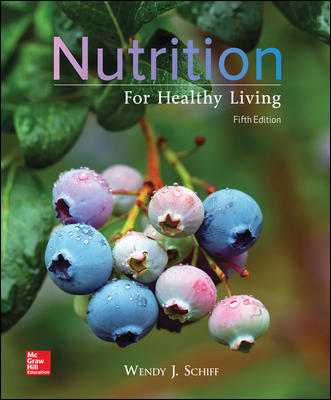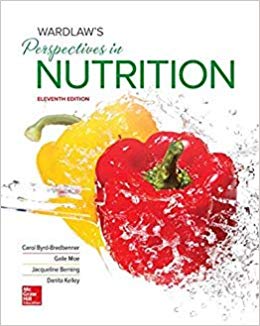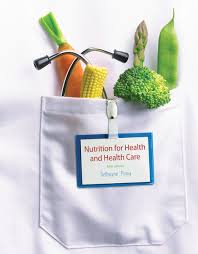Description
Test Bank For Nutrition For Healthy Living 5Th By Wendy Schiff
Chapter 02 Test Bank: Evaluating Nutrition Information
Treatment Practitioners
1. After examining a patient, a health care practitioner tells the patient that her mild back pain is caused by poor flow of energy from her mind to her back. The practitioner treats the patient with acupuncture, ginseng, and massage therapy. Based on this information, the practitioner’s treatments indicate that he relies on ________.A. integrative medicineB. alternative health careC. placebo-based health careD. conventional medicineAccessibility: Keyboard NavigationActivity Type: NewBloom’s Level: 3. ApplyLearning Outcome: 02.04.01 Explain the difference between conventional medicine and alternative health care, and identify health care practices that are either conventional or alternative.Section: 2.04Topic: Complementary and alternative medicineTreatment Options
2. After examining a patient and reviewing the results of his blood tests, a physician tells the patient that his mild depressive symptoms are not the result of a serious health problem. The physician suggests that the patient should try regular exercise and take the dietary supplement St. John’s wort for 3 months. After this period, the physician will prescribe antidepressant medication, if the patient does not feel emotionally better. This advice is ________.A. unreliable because the physician is not considering alternative methods of treating the patient’s mental illnessB. an indication that the physician practices integrative medicineC. typical for a conventional medical practitionerD. quackery and medically irresponsibleAccessibility: Keyboard NavigationBloom’s Level: 4. AnalyzeLearning Outcome: 02.04.01 Explain the difference between conventional medicine and alternative health care, and identify health care practices that are either conventional or alternative.Section: 2.04Topic: Complementary and alternative medicineReliable Nutrition Information
3. Which of the following statements is true?A. Scientific evidence supports the effectiveness of most forms of alternative health care.B. The RDN credential can be used by anyone who earns a college nutrition degree.C. A person with a PhD who promotes drinking vinegar as the cure for lung cancer is practicing quackery.D. Disclaimers are clues that a product will meet your expectations or the manufacturer’s claims.Accessibility: Keyboard NavigationActivity Type: NewBloom’s Level: 2. UnderstandLearning Outcome: 02.02.03 Identify common red flags that are signs of nutrition misinformation.Learning Outcome: 02.03.01 Explain how to identify reliable nutrition experts.Learning Outcome: 02.04.03 Discuss the risks and benefits of taking dietary supplements.Section: 2.02Section: 2.03Section: 2.04Topic: Complementary and alternative medicineTopic: Evaluating nutrition informationIdentifying Reliable Health Information
4. Which of the following statements is true?A. Scientific evidence supports the effectiveness of most forms of alternative health care.B. Disclaimers are clues that a product will meet your expectations or the manufacturer’s claims.C. A person with a PhD who promotes drinking vinegar as the cure for lung cancer is practicing conventional medicine.D. The RDN credential is legally protected.Accessibility: Keyboard NavigationActivity Type: NewBloom’s Level: 2. UnderstandLearning Outcome: 02.02.03 Identify common red flags that are signs of nutrition misinformation.Learning Outcome: 02.03.01 Explain how to identify reliable nutrition experts.Learning Outcome: 02.04.03 Discuss the risks and benefits of taking dietary supplements.Section: 2.02Section: 2.03Section: 2.04Topic: Complementary and alternative medicineTopic: Evaluating nutrition informationEvaluating Nutrition-Related Information
5. Which of the following statements is true?A. Disclaimers are clues that a product may not meet your expectations or the manufacturer’s claims.B. Anyone who earns a nutrition degree from a 4-year college can refer to himself or herself as an RDN.C. Scientific evidence supports the effectiveness of most forms of alternative health care.D. A person with a PhD who promotes drinking vinegar as the cure for lung cancer is practicing conventional medicine.Accessibility: Keyboard NavigationActivity Type: NewBloom’s Level: 2. UnderstandLearning Outcome: 02.02.03 Identify common red flags that are signs of nutrition misinformation.Learning Outcome: 02.03.01 Explain how to identify reliable nutrition experts.Learning Outcome: 02.04.03 Discuss the risks and benefits of taking dietary supplements.Section: 2.02Section: 2.03Section: 2.04Topic: Complementary and alternative medicineTopic: Evaluating nutrition informationRegistered Dietitian Nutritionists
6. A registered dietitian nutritionist has been trained to apply food and nutrition information to help treat many health conditions.TRUE
Accessibility: Keyboard NavigationActivity Type: NewBloom’s Level: 2. UnderstandLearning Outcome: 02.03.01 Explain how to identify reliable nutrition experts.Section: 2.03Topic: Evaluating nutrition informationTopic: Nutrition basicsAlternative Health Care
7. Scientific evidence provides considerable support for the effectiveness of most forms of alternative health care.FALSE
Accessibility: Keyboard NavigationActivity Type: NewBloom’s Level: 2. UnderstandLearning Outcome: 02.04.01 Explain the difference between conventional medicine and alternative health care, and identify health care practices that are either conventional or alternative.Section: 2.04Topic: Complementary and alternative medicineQuackery
8. A person who promotes the use of ginseng, garlic, and fish oil as the cure for cancer is practicing quackery.TRUE
Accessibility: Keyboard NavigationActivity Type: NewBloom’s Level: 2. UnderstandLearning Outcome: 02.02.03 Identify common red flags that are signs of nutrition misinformation.Section: 2.02Topic: Evaluating nutrition informationIdentifying Dietary Supplements
9. _____ can be classified as a dietary supplement.A. Chewing tobaccoB. Cherry jellyC. Ginkgo bilobaD. Orange drinkAccessibility: Keyboard NavigationBloom’s Level: 2. UnderstandLearning Outcome: 02.04.02 Explain how the FDA regulates medicines differently than dietary supplements.Section: 2.04Topic: Dietary supplementsWhat Is a Dietary Supplement?
10. _____ can be classified as a dietary supplement.A. Wheat germB. Chewing tobaccoC. Red wineD. Bitter orangeAccessibility: Keyboard NavigationActivity Type: NewBloom’s Level: 2. UnderstandLearning Outcome: 02.04.02 Explain how the FDA regulates medicines differently than dietary supplements.Section: 2.04Topic: Dietary supplementsFeatures of Dietary Supplements
11. A scientist discovers a chemical in certain rocks that kills bacteria when it is mixed with sterile water in a test tube. She cannot market extracts that contain this chemical as a dietary supplement, because it ________.A. has to receive a U.S. patent before the FDA will approve its useB. must first undergo scientific testing to determine its effectivenessC. does not contain dietary ingredientsD. contains more than one kind of natural materialAccessibility: Keyboard NavigationBloom’s Level: 3. ApplyLearning Outcome: 02.04.02 Explain how the FDA regulates medicines differently than dietary supplements.Section: 2.04Topic: Dietary supplementsUnderstanding Dietary Supplements
12. Which of the following statements is true?A. Physicians and registered dietitian nutritionists do not recommend dietary supplements for their patients.B. Dietary supplements may interact negatively with other substances a person takes.C. According to the legal definition developed by the FDA, a “dietary supplement” is a food that influences metabolism.D. People who develop side effects after taking dietary supplements can report their experiences to the GAO.Accessibility: Keyboard NavigationBloom’s Level: 2. UnderstandLearning Outcome: 02.04.03 Discuss the risks and benefits of taking dietary supplements.Section: 2.04Topic: Dietary supplementsDietary Supplements
13. Which of the following statements is true?A. According to the legal definition developed by the FDA, a “dietary supplement” is a natural substance that benefits health.B. Before taking a dietary supplement, people should determine whether the product is necessary and safe.C. Physicians and registered dietitian nutritionists do not recommend dietary supplements for their patients.D. People who develop side effects after taking dietary supplements can report their experiences to the GAO.Accessibility: Keyboard NavigationBloom’s Level: 2. UnderstandLearning Outcome: 02.04.03 Discuss the risks and benefits of taking dietary supplements.Section: 2.04Topic: Dietary supplementsIntegrative Health Care
14. Which of the following practices is an example of integrative health care?A. A surgeon who removes a cancerous tumor from a patient’s stomach.B. A physician who applies evening primrose oil to the skin of a person to treat a rash.C. A physician who has a patient take prescription medications to reduce chronic heartburn.D. A physician who treats a patient’s back pain with cortisone injections and massage therapy.Accessibility: Keyboard NavigationActivity Type: NewBloom’s Level: 3. ApplyLearning Outcome: 02.04.01 Explain the difference between conventional medicine and alternative health care, and identify health care practices that are either conventional or alternative.Section: 2.04Topic: Complementary and alternative medicineIntegrative Treatments
15. Which of the following practices is an example of integrative health care?A. Taking an aspirin and resting quietly to relieve a headacheB. Having surgery and physical therapy to treat a torn tendonC. Applying a prescription antibiotic to a wound and wrapping the affected area with sterile gauze to prevent infectionD. Having psychological counseling and taking St. John’s wort to improve moodAccessibility: Keyboard NavigationActivity Type: NewBloom’s Level: 4. AnalyzeLearning Outcome: 02.04.01 Explain the difference between conventional medicine and alternative health care, and identify health care practices that are either conventional or alternative.Section: 2.04Topic: Complementary and alternative medicineRoles of Federal Agencies
16. Which of the following statements is true?A. The EPA regulates the labeling of dietary supplements.B. Manufacturers of dietary supplements must inform the FTC about negative health reports that may have resulted from the use of their products.C. The FDA can recall a dietary supplements when there is evidence that it is harmful.D. Medicinal herbs must undergo testing for safety and effectiveness by the FDA before they can be marketed.Accessibility: Keyboard NavigationBloom’s Level: 1. RememberLearning Outcome: 02.04.02 Explain how the FDA regulates medicines differently than dietary supplements.Section: 2.04Topic: Dietary supplementsDietary Supplement Use
17. Which of the following statements is true?A. Consumers can report negative health reports that may have resulted from their use of dietary supplements to the FDA.B. Dietary supplements can include substances that are spread on the skin or injected into the body.C. Dietary supplements can be recalled if the products contain kava, lysine, or glucosamine.D. Medicinal herbs must undergo testing for safety and effectiveness by the FDA before they can be marketed in the United States.Accessibility: Keyboard NavigationBloom’s Level: 1. RememberLearning Outcome: 02.04.02 Explain how the FDA regulates medicines differently than dietary supplements.Section: 2.04Topic: Dietary supplementsDefining Dietary Supplement
18. A dietary supplement is a natural product that can be taken by mouth, injected into the bloodstream, or rubbed on skin.FALSE
Accessibility: Keyboard NavigationActivity Type: NewBloom’s Level: 1. RememberLearning Outcome: 02.04.02 Explain how the FDA regulates medicines differently than dietary supplements.Section: 2.04Topic: Dietary supplementsResearch Findings
19. Which of the following statements is true?A. It is not unusual for similar studies, especially those involving human subjects, to have different findings.B. Dietary recommendations are generally based on the findings of one team of nutrition researchers.C. The results of one study are usually enough to convince nutrition scientists to adopt new ideas about nutrition-related topics.D. Since 1970, nutrition information has undergone few updates, because scientists have discovered all of the nutrients and determined their functions.Accessibility: Keyboard NavigationBloom’s Level: 2. UnderstandLearning Outcome: 02.01.05 Discuss why similar scientific studies often have different results.Section: 2.01Topic: Scientific methodUnderstanding Research Outcomes
20. Which of the following statements is true?A. A scientist’s professional affiliations and sources of financial support may influence his or her research findings.B. The results of one study are usually enough to convince the majority of nutrition scientists to adopt new ideas about nutrition-related topics.C. Dietary recommendations are generally based on the findings of one well-respected team of nutrition researchers.D. Since 1995, nutrition information has undergone few updates, because scientists have discovered all of the nutrients and determined their functions.Accessibility: Keyboard NavigationBloom’s Level: 2. UnderstandLearning Outcome: 02.01.05 Discuss why similar scientific studies often have different results.Section: 2.01Topic: Scientific methodInterpreting Results of Studies
21. Which of the following statements is true?A. When interpreting results of their studies, researchers generally seek to include some bias into their analyses.B. Dietary recommendations are generally based on the findings of one team of nutrition researchers.C. Scientific studies to investigate the same question can have different findings.D. Since 1970, nutrition information has undergone few updates, because scientists have discovered all of the nutrients and determined their functions.Accessibility: Keyboard NavigationBloom’s Level: 2. UnderstandLearning Outcome: 02.01.05 Discuss why similar scientific studies often have different results.Section: 2.01Topic: Scientific methodTypes of Studies
22. A group of scientists suspects that certain dietary practices are partially responsible for different rates of hypertension among adults of different ethnic/racial groups. To test their hypothesis, the researchers examine data concerning the different population groups’ hypertension rates and their past dietary practices. This research is a(n) _____ study.A. hypotheticalB. retrospectiveC. case-controlD. prospectiveAccessibility: Keyboard NavigationBloom’s Level: 3. ApplyLearning Outcome: 02.01.01 Explain the basic steps of the scientific method.Learning Outcome: 02.01.03 Design a nutrition-related study that involves human subjects.Section: 2.01Topic: Scientific methodScientific Methodology
23. A group of registered dietitian nutritionists is planning to conduct a scientific study to investigate the effects of eating honey on school-age children’s behavior. At first, the researchers will ________.A. gather dataB. identify relationships between variablesC. analyze the hypothesisD. make observationsAccessibility: Keyboard NavigationBloom’s Level: 1. RememberLearning Outcome: 02.01.01 Explain the basic steps of the scientific method.Section: 2.01Topic: Scientific methodAnalyzing Study Designs
24. A medical researcher reads an article in “Today’s Health-Conscious Woman” magazine about the benefits of using the phytochemical capsaicin to treat knee pain. She asks 10 people with arthritic knees to rub a cream that contains the phytochemical on their knee joints for two weeks. At the end of the two weeks, the researcher asks the subjects whether their knee pain improved, stayed about the same, or worsened during the treatment period. After collecting responses from the people, the researcher reports the results of her study during a popular TV show that is hosted by a doctor. Based on this information, which of the following statements is true?A. The researcher reviewed scientific literature regarding the use of capsaicin to treat knee pain.B. The researcher used a standard scientific design for research involving human subjects.C. The researcher did not divide the subjects of her study into control and treatment groups.D. The researcher subjected the results of her study to peer-review.Accessibility: Keyboard NavigationBloom’s Level: 4. AnalyzeLearning Outcome: 02.01.01 Explain the basic steps of the scientific method.Learning Outcome: 02.01.02 Explain the importance of having controls when performing experiments.Section: 2.01Topic: Scientific methodUnderstanding the Scientific Method
25. A group of scientists conducts a scientific study to investigate dietary factors that influence the development of obesity. Which of the following activities is not likely to be a component of their research efforts?A. Making observations and formulating a hypothesisB. Collecting data and analyzing resultsC. Posting findings at the main researcher’s Internet web siteD. Submitting an article describing the study to a peer-reviewed journalAccessibility: Keyboard NavigationBloom’s Level: 1. RememberLearning Outcome: 02.01.01 Explain the basic steps of the scientific method.Section: 2.01Topic: Scientific methodDesigning Scientific Studies
26. According to the observations of a nutrition scientist, laboratory mice are healthier when their diet contains physiological levels of vitamin D than when their diet lacks the micronutrient. The scientist hypothesizes that mice will be less likely to develop cancer when they consume a diet that supplies megadoses of vitamin D.





Be the first to review “Test Bank For Nutrition For Healthy Living 5Th By Wendy Schiff”